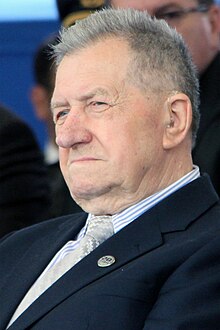Martin Špegelj
| Martin Špegelj | |
|---|---|

Martin Špegelj 2011
|
|
| 2nd Minister of Defence of Croatia | |
|
In office 24 August 1990 – 2 July 1991 |
|
| President | Franjo Tudjman |
| Prime Minister |
Stjepan Mesić Josip Manolić |
| Preceded by | Petar Kriste |
| Succeeded by | Šime Đodan |
| Personal details | |
| Born |
11 November 1927 Stari Gradac near Pitomača, Kingdom of Serbs, Croats and Slovenes |
| Died | 11 May 2014 (aged 86) Zagreb, Croatia |
| Political party | Croatian Democratic Union |
| Military service | |
| Allegiance |
Yugoslavia Croatia |
| Service/branch |
Yugoslav Ground Forces Croatian Armed Forces |
| Years of service | 1941–1989 1990–1992 |
| Rank |
Colonel General (YPA) General of the Army (HV) |
| Commands | Commander of 5th Army District YPA Croatian Defence Minister Chief of General Staff HV |
| Battles/wars |
World War II Croatian War of Independence |
Martin Špegelj (11 November 1927 – 11 May 2014) was the second Defense Minister of Croatia and, later, the chief of staff of the newborn Croatian army and inspector-general of the army. His efforts to organize and equip the army from scratch were seen as instrumental in helping Croatia survive the first year of the Croatian War of Independence. Partly due to disagreements with president Franjo Tuđman, he retired in 1992, after the war froze with the permanent ceasefire at the end of 1991.
Martin Spegelj was born 11 November 1927 in Stari Gradac, Pitomača. He was a partisan soldier during World War II. Eventually, he rose to become General of the 5th Yugoslav Army (JNA) Army District based in Zagreb, Croatia.
After the first free elections in Croatia, he was second Defence Minister. Špegelj was one of the few in the top leadership of Croatia who saw the impending war as unavoidable. Together with the Slovenian command, Špegelj formulated a joint defence plan in case either country was attacked by the JNA.
At the onset of the war in Croatia in mid-1990, the Croatian Serbs orchestrated an armed rebellion (known as the Log Revolution), refusing to accept Croatian government authority. As they were supported by the might of the JNA (first covertly, then openly), Croatia was virtually defenceless, so Špegelj undertook a campaign of acquiring arms through the black market community, importing weapons from former Warsaw Pact countries like Hungary and Romania.
...
Wikipedia
